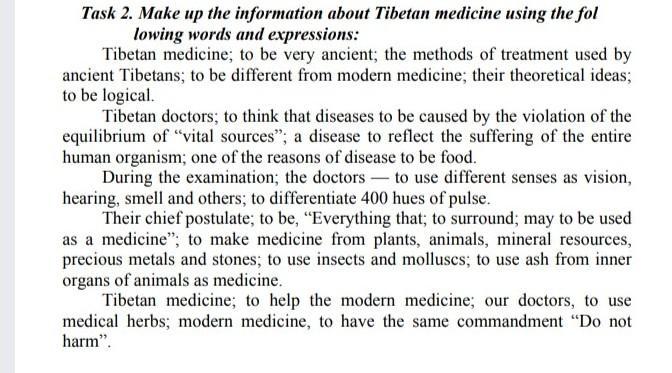Помогите пожалуйста с английским.

Ответы
Відповідь:
Tibetan medicine is an ancient and unique form of healthcare that dates back many centuries. It differs significantly from modern medicine in its theoretical concepts and treatment methods. Tibetan doctors adhere to a logical system of healthcare that has been passed down through generations.
One of the fundamental ideas in Tibetan medicine is the belief that diseases are primarily caused by the violation of the equilibrium of "vital sources." According to Tibetan medical philosophy, a disease is seen as a reflection of the suffering of the entire human organism, rather than just the manifestation of specific symptoms. They also consider food to be one of the contributing factors to the development of diseases.
During the examination of patients, Tibetan doctors employ a wide range of sensory observations, including vision, hearing, smell, and others. They are known for their ability to differentiate between an astonishing 400 hues of pulse, allowing them to gain valuable insights into a patient's condition.
A chief postulate in Tibetan medicine is the belief that "Everything that surrounds may be used as medicine." This means that they utilize a diverse range of resources for their treatments, including plants, animals, mineral resources, precious metals, and stones. Insects and mollusks are also used in their medicinal preparations. Additionally, they make use of ash from the inner organs of animals as a component of their medicine.
It's important to note that Tibetan medicine coexists with modern medicine and can complement it effectively. While our doctors may use medical herbs and modern medical practices, they share the common commandment of "Do not harm" with Tibetan medicine. This shows that both systems of healthcare prioritize the well-being of patients and aim to provide effective treatment and care.